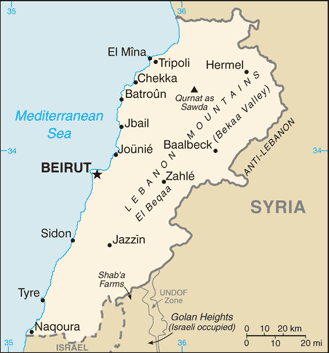Lebanon Working Group: An Overview | Areas of Focus | Meetings
Public Events | Partners | Lebanon Working Group Staff
Lebanon Working Group: An Overview
 In a joint initiative from 2011-2014, the Stimson Center co-sponsored the Lebanon Working Group with the US Institute of Peace (USIP). The Lebanon Working Group was created in the aftermath of the 2006 Israel-Lebanon war as a USIP-led effort to help coordinate reconstruction. Over time, the Working Group evolved to address the numerous complex issues that characterize Lebanon, but resonate well beyond its borders. These issues include sectarianism, political and economic reform, and broader conflict-related questions with a regional focus.
In a joint initiative from 2011-2014, the Stimson Center co-sponsored the Lebanon Working Group with the US Institute of Peace (USIP). The Lebanon Working Group was created in the aftermath of the 2006 Israel-Lebanon war as a USIP-led effort to help coordinate reconstruction. Over time, the Working Group evolved to address the numerous complex issues that characterize Lebanon, but resonate well beyond its borders. These issues include sectarianism, political and economic reform, and broader conflict-related questions with a regional focus.
In November 2011, the Stimson Center joined USIP as a co-sponsor of the Lebanon Working Group. The Stimson Center’s Mona Yacoubian and USIP’s Lucy Kurtzer-Ellenbogen co-directed the Working Group, which comprised of representatives from the US Government, think-tanks, academic institutions, and NGOs working on Lebanon. Meetings were primarily by invitation only and off-the-record. The Lebanon Working Group occasionally sponsored public events.
Areas of Focus

Lebanon sits astride several
major fault lines that characterize the Middle East. In particular, it
embodies sectarian tensions, especially Sunni-Shia tensions as well as those
between the Muslim and Christian communities. Lebanon also serves as an
arena for both global and regional conflicts, with particularly acute spillover
from Syria’s sectarian civil war. In addition, Lebanon remains a front line
state at war with Israel, as well as a proxy battlefield for the ongoing
conflict between the United States and Iran. In 2014, the
joint Stimson-USIP Lebanon Working Group focussed in particular on the Syrian
conflict’s impact on Lebanon, with a specific focus on sectarian dynamics and
the potential for renewed conflict in Lebanon as well as the socioeconomic
challenges to Lebanon that originate with the growing Syrian refugee
population.
Meetings
“Syria’s Sectarian Spillover into Lebanon,” February 03, 2014, with Paul Salem, Vice President, Middle East Institute; Sahar Atrache, Senior Analyst, International Crisis Group.
“Understanding Hezbollah’s Strategic Calculus,” September 12, 2013, Randa Slim, Research Fellow, New America Foundation.
“Lebanon, Syria, the Role of the Lebanese Armed Forces,
and U.S. Policy,” May 31, 2013, MG Walid Salman, Chief of Staff, Lebanese
Armed Forces
“Northern Bekaa as a Prime Potential Flashpoint,” May 3, 2013, Andrew Tabler, Senior Fellow, The Washington Institute for Near East Policy
“Peacebuilding in
Lebanon: A Presentation by the lead authors of Accord 24 Positive Peace for
Lebanon,” December 12,2012, Elizabeth Picard, Centre National de la
Recherche Scientifique; Alexander Ramsbotham, Conciliation Resources;
Marie-Joelle Zahar, Universite de Montreal
“The Economic Implications of the Syrian Uprising for Lebanon,” November 13, 2012, Former Prime Minister and current Member of Parliament, Fouad Siniora
“Lebanon’s Broadening Humanitarian Crisis in the Shadow of the Syrian Conflict,” October 5, 2012, Jacob Kurtzer, International Committee of the Red Cross, and Michael Shaikh, Center for Civilians in Conflict.
“Prospects
for Renewed Hostilities between Israel and Lebanon,” July 30, 2012,
Ambassador Daniel Kurtzer, Woodrow Wilson School, Princeton University and
former US Ambassador to Egypt and Israel and Dr. Randa Slim, Scholar, Middle
East Institute
“Understanding
Sectarian Tensions in the wake of the Syrian Uprising,” June 7, 2012,
Alistair Harris, Director, Pursue and Robert Malley, Program Director, Middle
East and North Africa, International Crisis Group
“A Discussion with Ambassador Maura Connelly,” March 21, 2012
“Iran’s Role in Lebanon,” February 24, 2012, Ellen Laipson, President and CEO, Stimson Center, and Aram Nerguizian, Visiting Fellow, Burke Chair in Strategy, Center for Strategic and International Studies
“Hezbollah’s Evolution Since the 2006 Lebanon-Israel War,” November 18, 2011, Nicholas Blanford, Beirut correspondent, Christian Science Monitor and Times of London
Public Events
“Lebanon and the Arab Spring: A Congressional View” with Representative Charles Boustany, May 10, 2011. Click here to listen.
“Crisis in Lebanon: Sectarian Politics, Regional Dynamics and the U.N. Special Tribunal,” December 8, 2010. Click here to listen.
“Promoting Political Reform in Lebanon,” September 29, 2010. Click here to listen to part one, and click here to listen to part two.
“Lebanon’s Municipal Elections: Prospects for Reform,” May 7, 2010, U.S. Institute of Peace
“Assessing the Impact of Lebanon’s Parliamentary Elections,” June 15, 2009. Click here to listen.
“Is Lebanon Sliding Toward a New Civil War?” May 15, 2008. Click here to listen.
Partners
For more information on the US Institute of Peace, click here.
Middle East/Southwest Asia Program Director
 Ellen Laipson is president
Ellen Laipson is president
and chief executive officer of Stimson. She also directs the Middle
East/Southwest Asia program, and focuses in particular on security
issues in the Gulf region. Laipson joined Stimson in 2002, after 25
years of government service. Read More
>>
Lebanon Working Group Co-Director

Mona Yacoubian worked with the Stimson Center from 2011-2014. She previously served as a Special Advisor and Senior Program
Officer
on the Middle East at the US Institute of Peace where her work focused
on Lebanon and Syria as well as broader issues
related to democratization in the Arab world. Ms.Yacoubian has worked as
a
consultant on the Middle East for several
years. From 1990-1997, she served as the
North Africa analyst at the US Department of
State. Read More >>
